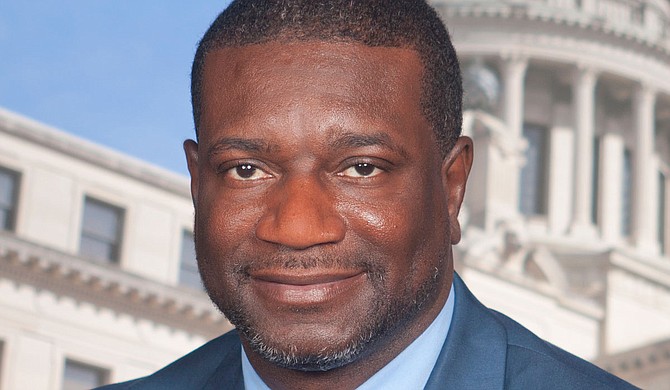Corrections Chairman Sen. Juan Barnett, D-Heidelberg, says a last-minute smear campaign derailed the Mississippi Correction Safety and Rehabilitation Act. Photo courtesy Mississippi Senate
Parole reform in Mississippi hit a brick wall this week, with Gov. Tate Reeves vetoing the bipartisan legislation that would have provided more, and earlier, opportunities for parole hearings in Mississippi’s overburdened prisons.
Senate Bill 2123 was an attempt to reverse damage the Mississippi Legislature inflicted in the mid-1990s when it amended the state’s parole requirements to be much harsher, Senate Minority Leader Derrick Simmons, D-Greenville, argues. That, he said, has contributed to the state’s growing prison population.
Mississippi’s prison population has more than doubled since the early 1990s with more than 19,000 people now incarcerated statewide.
The legislation had received bipartisan support in the Legislature before reaching the governor’s desk, though Reeves cited Senate Republicans as part of why he rejected the bill. “While some of my friends and good people supported it, two-thirds of Republicans in the Senate voted against it,” he said. “That says something to me.”
The governor laid out his reasoning for the veto on his official Facebook page. “I’m generally sympathetic to the arguments. These individual bills go too far,” Reeves said. “Right now, you’re eligible to get out of prison at 60 unless you’re a trafficker, habitual offender or violent criminal. This totally eliminates those protections.”
Under SB 2123, geriatric prisoners convicted of those and less serious crimes would be eligible for a parole hearing—not automatic parole—after reaching age 65 and under condition of serving at least 10 years and 25% of their sentence.
As of last October, the Mississippi Department of Corrections housed 1,091 geriatic prisoners, out of which parole restrictions prevent all but two from even seeking parole.
Reeves indicated unwillingness to budge on those restrictions: “For example, it says a criminal can get parole if they’re convicted of crimes that could get them the death penalty, but they get sentenced to life imprisonment instead.”
This is true if a court chooses not to impose the death penalty, but if a court imposes a sentence of life without parole then they are still ineligible for parole, regardless of whether SB 2123 is signed into law.
Reeves acknowledged that parole decisions still require the consent of the parole board, which the governor appoints, and suggested that he would trust the judgment of his own appointees, but not necessarily those who come after him. “I have a maximum of seven years and five months left, serving as governor. And I have no idea who is going to be the next governor,” he said.
Sen. Brice Wiggins, R-Pascagoula, one of the bill’s supporters and conferees, responded with frustration to a tweet questioning if Reeves would’ve passed the bill with a repealer, which would have required the Legislature and the governor to reauthorize the bill after a certain period of time. “Please. Would've been an easy fix. They had 7 months to have weighed in but didn't,” Wiggins tweeted.
“We should trust the process. Trust the individuals we have in charge. It's not just one individual or two individuals, it's the entire parole board that has to make that decision,” Corrections Chairman Sen. Juan Barnett, D-Heidelberg, told the Jackson Free Press today. The senator asserted that opponents of the bill used scare tactics and misinformation to kill the effort at the last minute, without participating in the process to craft the bill.
"Mississippi has the second largest incarceration rate in the world. SB2123 addressed Mississippi's growing prison crisis, ensured our criminal justice system protects against real threats, and reduced the burden of corrections on taxpayers in the tune of millions of dollars," said Senate Minority Leader Derrick Simmons, D-Greenville, one of the bill's additional authors. "It was bipartisan policy," lamented Simmons.
Mississippi is one of 30 states to still retain the death penalty. The State has not executed any inmates since 2012’s execution of Gary Carl Simmons Jr. under Gov. Phil Bryant, but the Mississippi Department of Corrections currently has 41 people on death row.
The future of the parole-reform movement in the state is now in the hands of the Legislature, still quarantined after a widespread coronavirus outbreak among lawmakers, including both Philip Gunn, R-Clinton, and Lt. Gov. Delbert Hosemann.
“Regardless of the COVID pandemic that's here, the prison issue is still around. And we have to focus on it,” Barnett said.
Email state reporter Nick Judin at nick@jacksonfreepress.com and follow him on Twitter @nickjudin. Email state intern Julian Mills at julian@jacksonfreepress.com.
More like this story
- Forgiveness is Freedom: After Veto, Parole Reformers Fight On
- Parole Reform Passes to Governor’s Desk Amid Murky Future
- Analysis: Push to Revise Parole Survives Despite Gov's Veto
- Mississippi Bill Would Give Thousands a Chance at Parole
- Parole Reform Law Brings New Chance For Thousands, But Not Habitual Offenders



Comments
Use the comment form below to begin a discussion about this content.